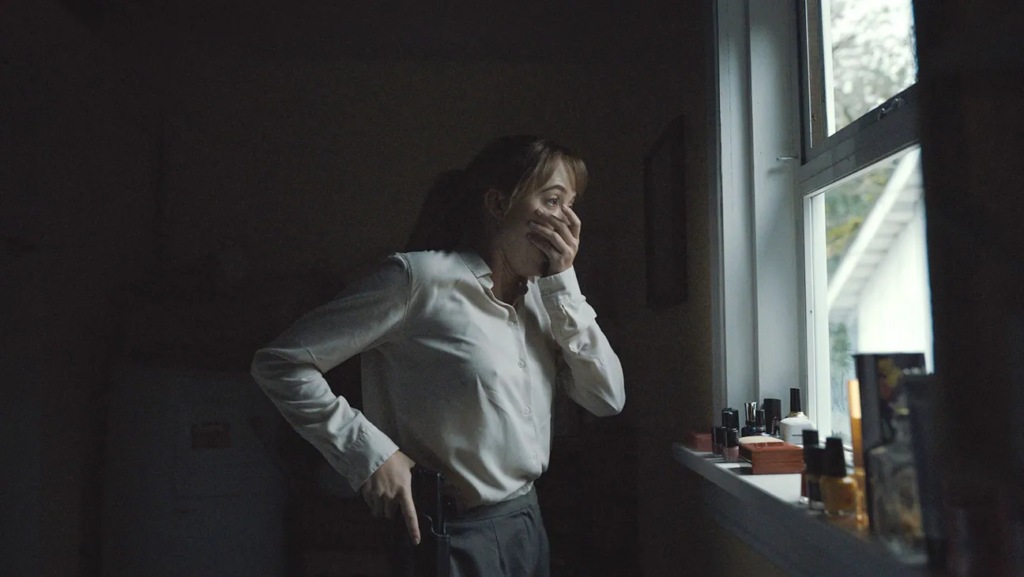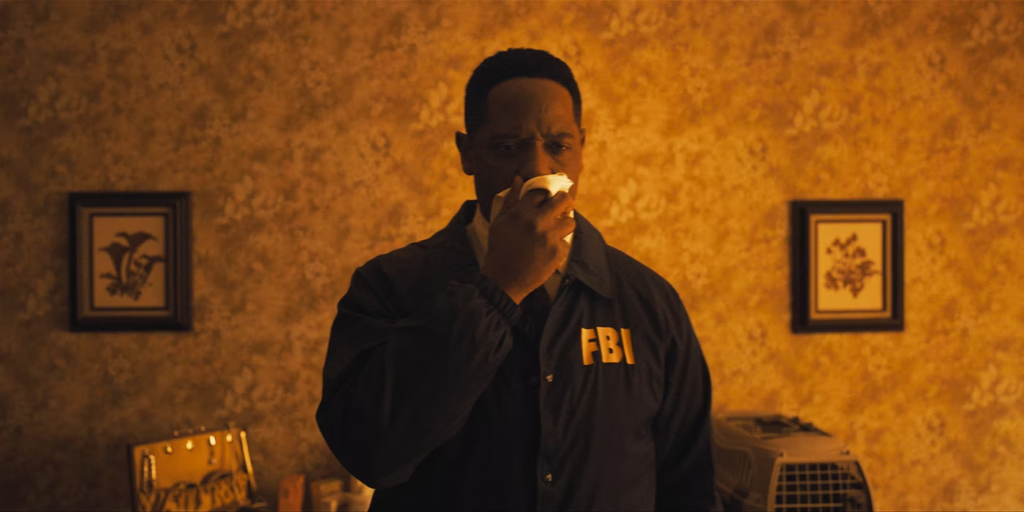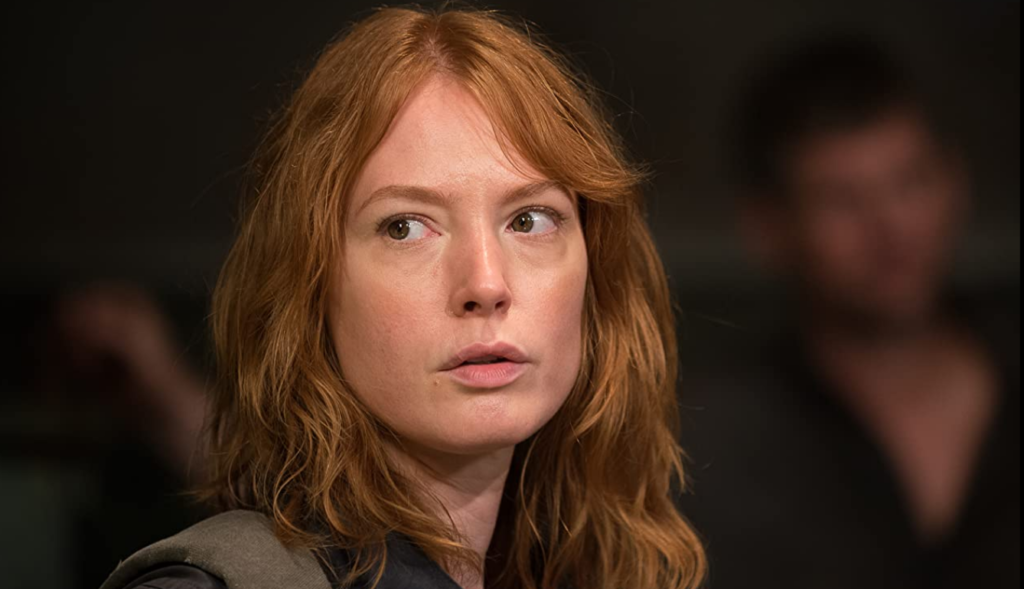There’s been much talk about Osgood Perkins’ Longlegs in the build-up to its release. The hype placed upon the shoulders of this film has been massive, in large part thanks to the brilliant marketing campaign that has run for months. But external materials aside, who wouldn’t be excited for this? It has a stellar cast, was helmed by a well-established horror writer/director, and seemed genuinely frightening. Upon seeing the film, I could only describe it as being evil. It lingered in my mind for days, and luckily, the terrifying imagery of this film was burned into my mind when given the opportunity to interview some of the people that worked on the film. Longlegs is most certainly a film that will burrow its way into your brain, but to hear the different interpretations of the film and the characters themselves proved this is a film that doesn’t go down easy, and it’s all the better for it.
——————————————————————
Alex Papaioannou
What terrified you most about Longlegs?
Osgood Perkins
Nothing terrifies me.

Maika Monroe
[Laughing.] Nothing.
OP
Nothing terrifies me about Longlegs. I think Longlegs is sad. For the character himself, I think he’s sad. Human. Funny. Weird. Grotesque. I have a certain level of sympathy. I know it’s a weird thing to say. But if you’re not sympathetic to your monster, it’s a little bit of a weird dynamic. If I think the monster is just monstrous, it’s going to end up being pretty flimsy. So I tried to see past all that, and tried to find the person under all of it.
MM
Hmm. Yes, you did.
OP
I did!
AP
Maika, a lot of the film has you acting either in these very wide open, empty spaces, or claustrophobic locations. So what do you channel when performing against essentially nothing, your scene partner basically being the specter of horror?
MM
A lot of people have been talking about the cinematography, which, obviously, when I saw the film for the first time, I was absolutely blown away. The film is so beautiful. The shots of how wide it gets makes you have this eerie feeling. It does all the things! But as the actor, I never ask about it when I’m on set and about to film. I don’t need to know how close we are or how far we are. It doesn’t change my performance. I think the set design was amazing. Everything around me was all-consuming, and I just tried using all of that to my advantage.
AP
When thinking back on this film, it almost feels like it’s evil. So I’m curious, do you have any fun on-set memories to lighten the mood for audiences just coming out of it?
MM
A lot of fun on set! It was fun all the time. [Laughs.]
OP
Being on set is just a good time. I mean, you’re with people who you theoretically like. We’ve been lucky to have good crews and good casts. Nobody’s toxic and nobody thinks they’re special. And at a certain point, it’s just play, right? I’m trying to approach the creation of any of these things like that. Especially with a group of fun, young people. Because everyone’s younger than me now! It’s become a thing where everyone is now half my age. So I just have to deal with that now. But everyone just gets up in the morning to do something that they think is cool. [Smiling.] Sometimes I sort of pit departments against each other. And everybody wants their department to win. It’s not like American Gladiators! Sometimes we like to just go, “Oh, who is the best department this week?” And it always just gets everybody going a little bit.
AP
Longlegs is obviously very scary. What terrified you most about it?

Blair Underwood
Phew! What terrified me most was, as the character, trying to figure out: How is the crime happening? We know that families are dying, but how is it happening? Is Longlegs involved? If so, how is he involved? Without giving too much away, those are the elements. Those are the questions that I was asking when reading the script initially. And it’s also what was terrifying, and it’s what pulls you in from the first minute up until the end of the film. Just trying to figure it all out.
AP
And with that sense of the unknown that you’re referring to, I’m thinking of that final scene. Without spoiling it, it’s very shocking. And it’s all there in your face. So what’s going through your mind on that day of filming?
BU
I just wanted to make sure I struck the right tone. Because Oz put some very fun, tongue-in-cheek lines here and there. But what’s happening on-screen is very, like most of the film, horrific.
AP
As far as I can recall, I don’t think you share any specific scene with Longlegs himself. So looking at the antagonist of the film from a distance, what’s that relationship like? Either while on set, or in your character’s head when performing?
BU
It’s just a great, great mystery from the character’s point of view. But from a creative actor’s point of view, I was just excited to see what Nicolas Cage was going to bring to the role. His was a whole different approach. How the character looks, how the character sounds, how the character feels. All of that just added a whole other layer of excitement to this film, I believe.
AP
You know, your character does have these lighter moments. So how did you balance that when knowing this film goes in such dark directions?
BU
It really is just trusting in the director. Oz directed, but he also wrote the film. Nobody knows like the creator of the film knows what it’s supposed to feel and look like. I tend to give many different options. So I may do something big, and then maybe something more subtle, something small. Then he’ll decide in the editing room what he wants to use. Though I have learned to not go too big, because the craziest thing you do may end up in the film, and that may not be what you want to see committed to film for the rest of your life. [Laughs.]
AP
What terrified you most about Longlegs?

Alicia Witt
[Thinks for a moment.] I didn’t feel terrified. I was so immersed. And to clarify, this character was so personal and intense in my channeling of her that I have not watched the film. Because I don’t feel this is mine to watch. It was mine to channel, and leave there for you to watch. But I don’t feel the need to see what I did from the outside. So the movie itself, I haven’t experienced. But reading the script, it was all about discovering Ruth. And Ruth lit me up. She lit a fire in my veins, and I longed to play her. So it was the deepest sort of inspiration to be trusted with a role like this. And to have had the privilege of working with a world-class filmmaker, like Osgood Perkins! To me, he’s in a league with David Lynch, or Cameron Crowe, or any of the extraordinary directors I’ve gotten to work with. He’s just as good as any one there is. You trust him fully and you just kind of let go. So I didn’t feel terrified. I felt a sense of deep catharsis from playing this role.
AP
And it’s a wonderful performance. You’re doing a lot of heavy lifting in that final scene. So what was going through your head on set that day?
AW
Much like with all of the scenes, I let what was inside out. And I trusted that Oz was not going to stop until he got what he wanted. In fact, that finale, when it came time to shoot my coverage, I was provided a safe space. He gave me free reign, but he also let me know every step of the way that he had me. That he wasn’t going to let a scene end until he had gotten what he needed. And he gave me six or seven diametrically opposed directions for my coverage, knowing that I could handle it. That I could provide different versions of what Ruth’s reaction might be, and using parts of all of them. We went from the most intense grief, to crying from the depths of the soul, to fury, to mischief… [Smiles.] To joy! Completely unhinged to reverent. And we did it in such quick succession that I had no time to think. There was no time to question or be left in the previous version. And that was the greatest thrill. It was the greatest tightrope I’ve ever been placed on in my whole professional career so far.





